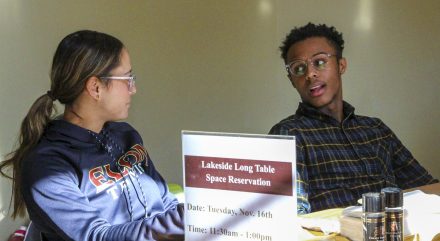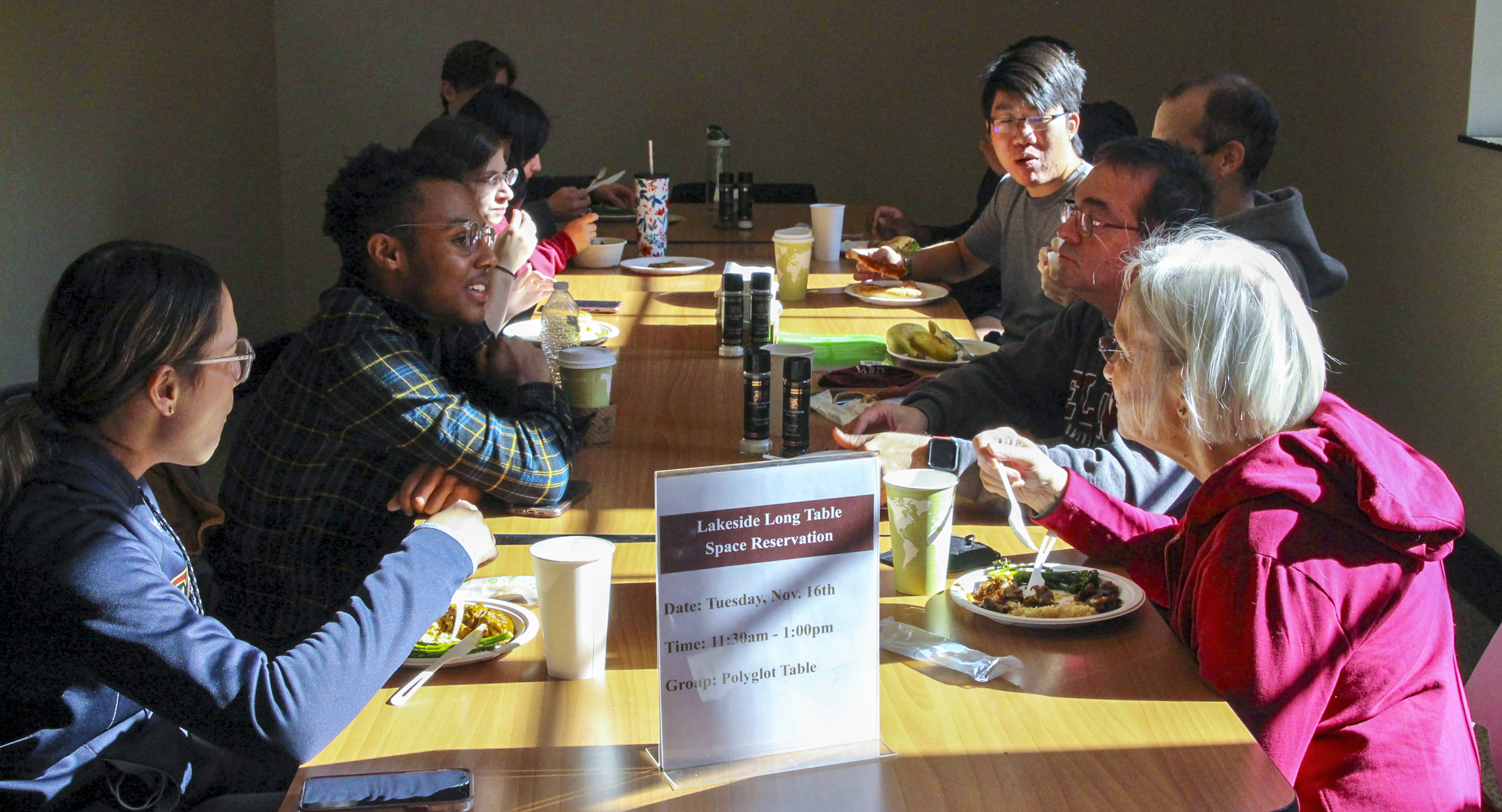The Polyglot Lunch is held each Tuesday from 11:30 a.m. to 1 p.m. in Lakeside Dining Hall, free for faculty, students and staff interested in improving language skills.
Fill your plate, grab a seat and take a trip around the world.
Your journey will include stops in France and Spanish-speaking regions, with detours into Italy, China, Germany and possibly the Middle East. No passports or baggage are required, just an appetite for friendly conversation in a foreign tongue and a thirst for knowledge.
Welcome to the Polyglot Lunch. Held each Tuesday from 11:30 a.m. to 1 p.m. in Lakeside Dining Hall, it’s a place for students of foreign languages to strengthen conversational fluency in a welcoming, low-pressure setting.

The experience — absorbing conversations in and about four different languages simultaneously — is intellectually exhilarating.
“My experience at the table has been phenomenal,” said Nicholas Rugbart ’25, whose enthusiasm for Chinese language and culture began in middle school. “Just to sit and hear other people speaking in different languages, to be in the middle of all that knowledge going around, it gives me motivation to continue learning.”
The polyglot table has been on Elon’s menu for close to eight years. Casual conversation and fluid interaction among students and faculty of various languages are its key ingredients. Lunch is free for faculty, staff and students, they just need to tell the cashier they’re attending the Polyglot Lunch.

This fall, a handful of faculty regularly joined the lunches: Lecturer in Spanish Ricardo Mendoza, Professor of Spanish Nina Namaste, Associate Professor of French Olivia Choplin, Associate Professor of Italian Samuele Pardini, Associate Professor of Italian Brandon Essary, Lecturer in Chinese Binnan Gao and Adjunct Assistant Professor of Chinese Francis Falzarano. They eagerly conversed with students on topics from Halloween costumes and weekend activities to international economics and fair trade. Every so often, the table slipped into English as speakers of different languages discussed the etymology behind words and phrases or compared customs with one another.
“It’s been one of the most effective ways to learn practical Italian and learn the language in a much more memorable way,” said cinema major Henry Zinn ’24. “Conversational vocabulary is different than a lesson you get in a classroom. And at the table, there’s no pressure because you’re not being graded and it’s not a class.”

The casual, drop-in atmosphere accommodates newcomers among the regulars in each language. People will sit down for 15 minutes between classes, catch up with friends, then rush off to their next class. Their empty seat is soon filled.
Most students who attend aren’t world language and culture majors. It’s more likely that they enjoy or are curious about their chosen language and are preparing for experiences abroad, said Mendoza, one of the lunch’s organizers.
If it’s your first time at the table, there’s a good chance you’re not the only first-timer there. Expect to be welcomed but not pressured into speaking.
Dejour Banks ’24 enjoyed his third semester at the table this fall. Now a skilled Spanish speaker, he spent his first months listening.

“I would listen for 30 or 40 minutes, and that helped me learn the flow of the language, how they pronounced certain words, and understand how to structure sentences,” Banks said. “Then there came a point where I knew I had to step outside of my comfort zone and put the language together. It’s a safe place to make mistakes without anyone judging you or laughing at you.”
Rugbart echoed that.
“I was timid at first, too. Now I’m just so glad I joined,” Rugbart said. “I would encourage people to take the risk and join the lunch, especially if they really want to learn a language. You’re going to progress rapidly, it’s an embracing community, and everyone shares the same goal to improve their fluency.”



